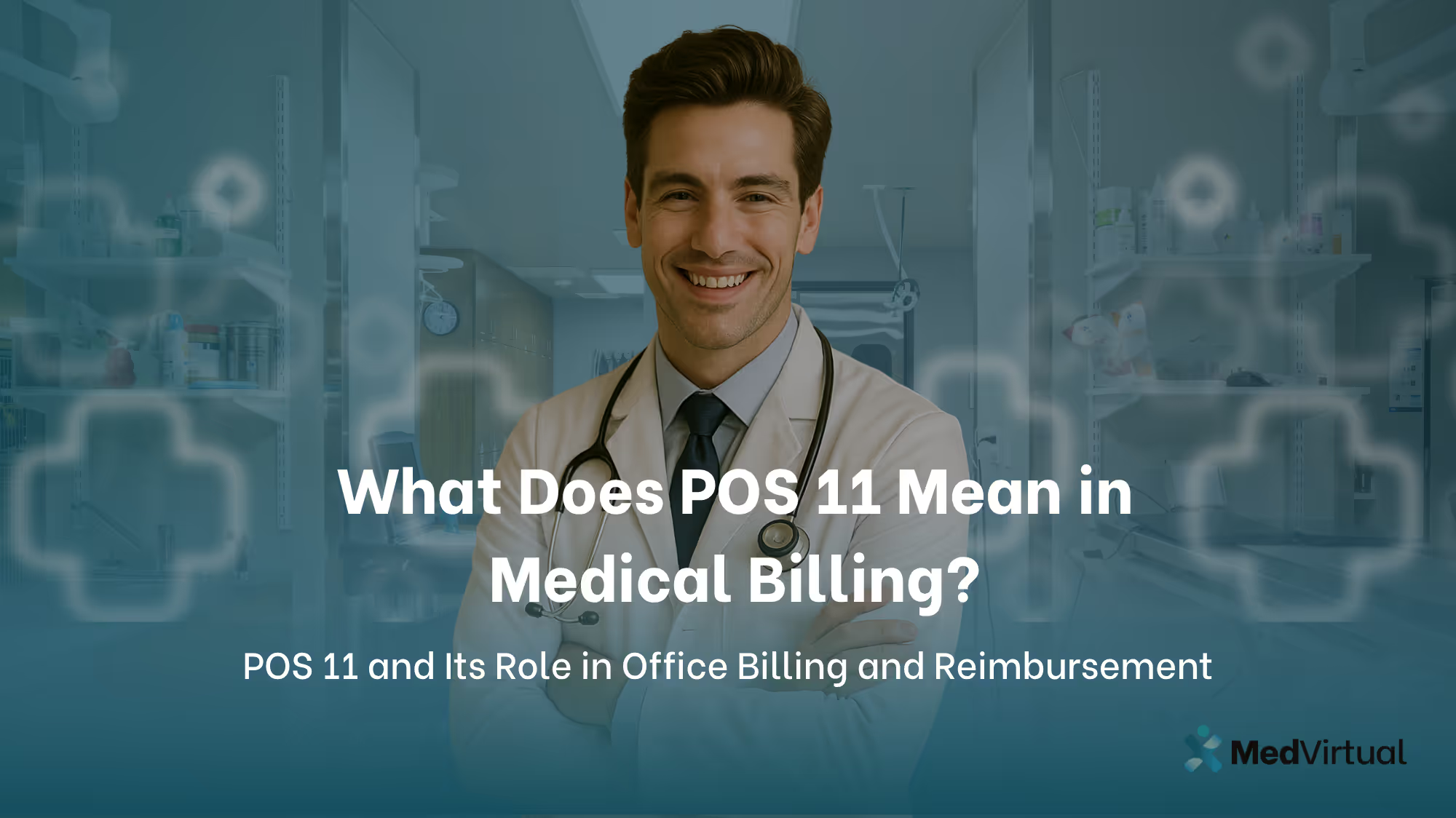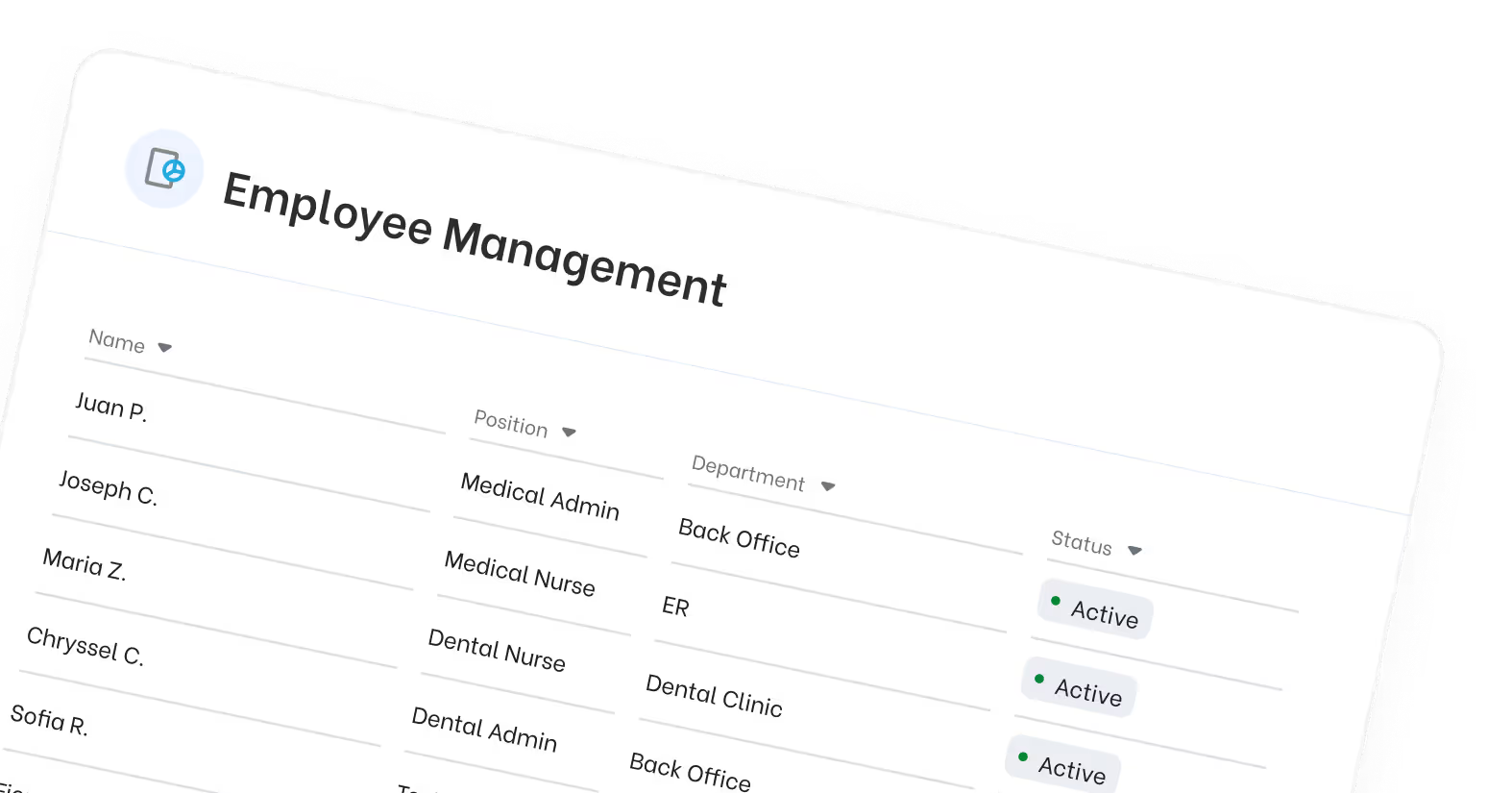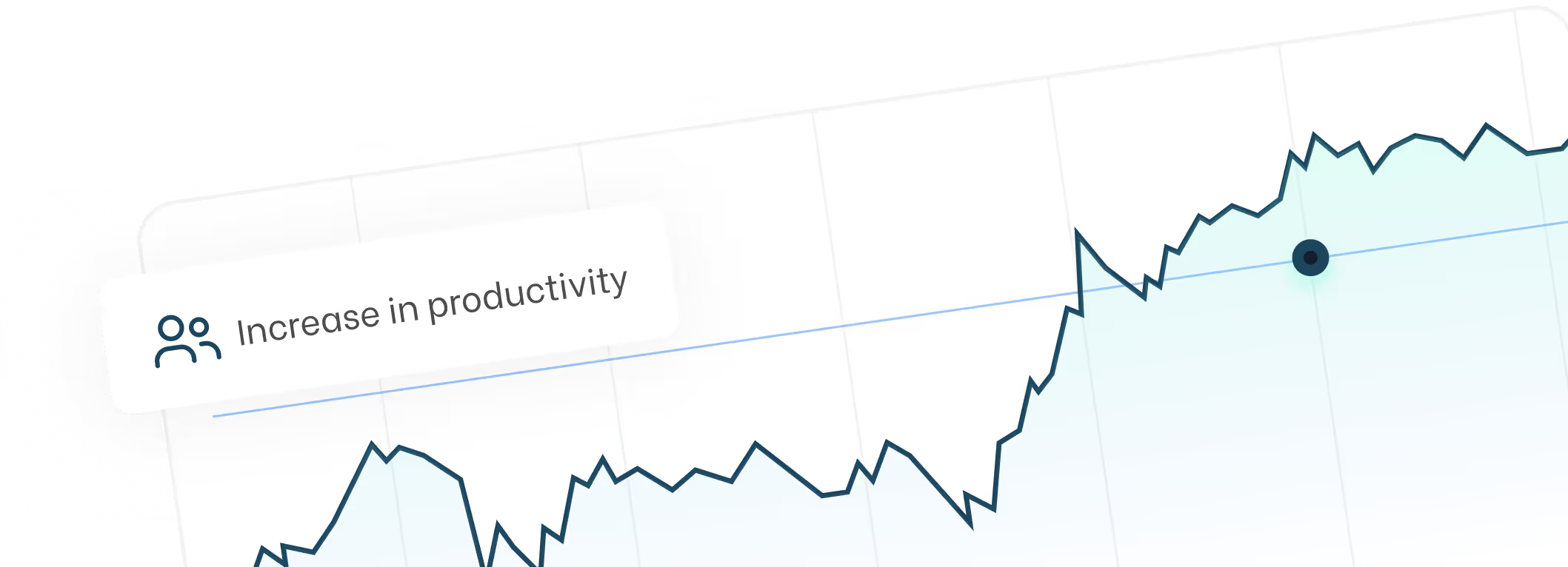What Does POS 11 Mean in Medical Billing?

POS 11 in medical billing refers to services rendered in a physician’s office or an independent clinic within the United States healthcare system. It is a non-facility POS code used specifically in US medical billing to indicate a non-hospital setting where licensed healthcare professionals routinely evaluate and treat sick or injured persons.
In US medical billing, Place of Service (POS) codes are two-digit identifiers used on professional claims submitted to Medicare, Medicaid, and private insurers to specify the setting where healthcare services were provided. These codes are essential for accurate claims processing under US healthcare regulations and ensure that healthcare providers receive appropriate reimbursement rates based on the service location.
MedVirtual is committed to enabling US healthcare providers and practice managers to simplify complex billing practices in compliance with US billing standards. This blog will explain POS 11 as used in the US, when it should be used, why accuracy matters, and how it impacts patient accounts and reimbursements.
Whether you’re a seasoned US medical biller or just getting started, understanding what POS 11 means in medical billing in the United States can help you avoid costly mistakes and streamline your revenue cycle with streamlined billing processes.
Defining POS 11
POS 11 stands for "Office" in the Place of Service POS code set. It indicates that the healthcare service was provided in a physician’s office, doctor's office, or qualified healthcare professional’s private office, rather than in a hospital or institutional medical facility.
According to the Centers for Medicare & Medicaid Services (CMS), POS 11 refers to:
“A location, other than a hospital, skilled nursing facility (SNF), military treatment facility, community health center, state or local public health clinic, or intermediate care facility, where the health professional routinely provides health examinations, diagnosis, and treatment of illness or injury.”
This is the default POS code for most outpatient visits and outpatient services delivered in a standalone clinic, group practice, or solo practitioner’s office. It is often used in claims for services provided like routine physical exams, follow-up visits, minor procedures, and other face-to-face consultations in a clinical setting not affiliated with a hospital or hospital outpatient department.
Using POS 11 in medical billing correctly is essential for ensuring that claims are processed without delays or claim denials and that providers receive the correct reimbursement, pos billing codes for the office setting.
When to Use POS 11
You should use POS 11 on claims when the service is provided in a physician’s office, independent clinic, or outpatient clinic not part of a hospital or institutional facility. This includes solo practices, group medical offices, and leased office spaces where licensed healthcare professionals see patients for evaluation and treatment.
Common examples of services that fall under POS 11 include:
- Routine check-ups and physicals by a family doctor
- Chronic disease management visits (e.g., diabetes, hypertension)
- Follow-up consultations after surgery or hospital discharge from an inpatient hospital
- Preventive care screenings (e.g., Pap smears, blood pressure checks)
- Minor procedures such as joint injections, mole removal, or wound dressing changes
- Physical therapy and rehabilitation services are provided in an office setting
Do not use POS 11 if the services were delivered in any setting affiliated with a hospital (e.g., hospital outpatient unit, hospital outpatient department, or ambulatory surgical center), urgent care facility, emergency room hospital, or other institutional environment. Doing so can result in claim denials or reduced reimbursements.
To sum up: If your patient walks into your doctor's office or independent clinic and receives care, POS 11 is likely the correct code.
Importance of Accurate POS 11 Usage
Using POS 11 correctly plays a vital role in any healthcare practice's financial health and compliance. While it may seem like a small detail, the implications of this code reach far beyond the claim form.
Proper Reimbursement and Reimbursement Rates
Insurance payers calculate reimbursement rates based in part on where the service was performed. Services reported under POS 11 often qualify for higher reimbursement than those provided in hospital-affiliated settings. Using this code properly helps ensure that providers are paid at the correct rate for services rendered in a private office environment, improving patient account management and patient account analytics.
Audit Risk and Compliance
Incorrectly assigning POS 11 can raise red flags during payer audits. Suppose services are billed under POS 11 but were provided in a different setting, such as a hospital outpatient clinic or skilled nursing facility. In that case, this can result in claim denials, payment recoupments, or even penalties. Consistent errors can damage a provider’s reputation with payers, leading to closer scrutiny.
Workflow Efficiency and Claims Processing
Accurate POS coding reduces claim rework, prevents payment delays, and improves the efficiency of your revenue cycle. It also ensures that your billing team isn’t spending unnecessary time fixing avoidable mistakes or handling appeals. Proper use of billing codes and insurance verification tools, often integrated into accounting software and practice management tools, supports integrated payment processing and optimizes billing data management.
In short, taking the time to assign POS 11 is right for your revenue and reputation. Attention to coding accuracy is essential for a smooth billing process and optimal reimbursement.
Common POS 11 Coding Errors to Watch Out For
Despite being widely used, POS 11 is frequently misapplied, often due to assumptions about the service location or a misunderstanding of payer guidelines. These errors can result in claim denials, underpayments, or audit exposure.
Mistaking Hospital-Owned Clinics for Independent Offices
A common error is billing hospital-owned outpatient clinics on the hospital’s main campus as independent physician offices. Even if the setting looks and operates like a private practice, if it’s affiliated with or operated by a hospital, you should use POS 22 instead of POS 11 in medical billing.
Misusing POS 11 for Urgent Care or Surgical Facilities
Another frequent mistake is using POS 11 for services rendered in urgent care facilities or ambulatory surgical centers (ASCs). These settings require specific codes, POS 20 for urgent care and POS 24 for ASCs, because the reimbursement structure
Avoiding these mistakes requires clear documentation, regular staff training, and a robust internal review process. The more diligent your team is about using POS codes correctly, the fewer billing issues you'll face.
Stay Compliant and Confident with POS 11
Correctly using POS 11 in medical billing ensures accurate reimbursement, minimizes compliance risks, and keeps your revenue cycle running smoothly. By understanding when and how to apply this code, and avoiding common mistakes, you position your practice for financial stability and operational efficiency.
At MedVirtual, we help healthcare providers and billing teams navigate the complexities of medical coding with confidence. Whether managing a solo practice or overseeing a multi-location clinic, our virtual staffing solutions are designed to streamline your workflow and improve claim accuracy.

Ready to Take Control of Your Medical Billing?
Let MedVirtual support your practice with experienced virtual medical billing assistants trained in industry best practices.
Visit medvirtual.ai to learn how we can help you optimize your billing process and reduce costly errors—starting today.






